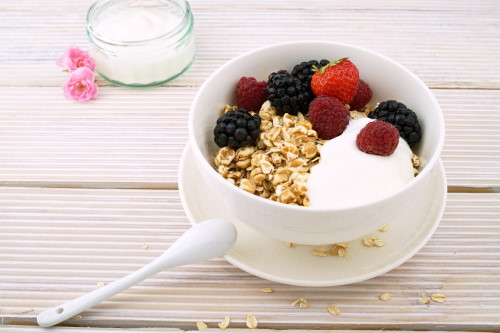Non-dairy plant-based milk now accounts for about 10% of the total milk market. There are many reasons for the increase in the popularity of non-dairy milks. However, one of the main reasons is a result of the increase in the adoption of vegan and plant-based diets, whether that be for health, moral, or environmental concerns.
Beyond this, the range of plant-based milks allows consumers to express their tastes, identities, as well as personalize their diets to achieve their health goals. Which is the best non-dairy milk option? Here we break down the best non-dairy milk options for your health goals.
BREAKING: Newly Legalized Herb Relieves Pain - Available Without A Prescription
The Best Non-Dairy Milk Options
Soy Milk
Globally, soy milk has been the most popular non-dairy substitute since, well, since it hit the market. This is primarily because soy milk’s nutrition profile closely resembles cow’s milk. It’s also rich in protein with about seven grams per cup. Cow’s milk, for comparison, has eight grams per cup. In addition, soy milk has a higher content of monounsaturated and polyunsaturated fats than saturated fats.
Aside from its naturally cholesterol-free and vegan properties, soy milk contains isoflavones, which are antioxidants that may reduce excess inflammation in the body.
Almond Milk
In the United States, almond milk is the most sold type of plant-based milk. Because of its mild flavor, many people find it highly palatable, especially compared to some of the stronger flavors on this list.
Another reason so many gravitate toward almond milk is because it’s naturally low in carbohydrates. A 3.5-ounce serving of almond milk contains approximately 0.3 grams of carbs. Cow’s milk, for comparison, has about 4.6 grams of carbs as lactose, which is the natural sugar found in milk.
Almond milk is also high in monounsaturated fatty acids. This type of healthful fat may support weight loss and weight management.
However, many people are beginning to lean away from almond milk options as almonds are a highly water-intensive plant, and many areas that grow almonds well (e.g., California) have been experiencing severe droughts.
Oat Milk
Oat milk is having a moment in the spotlight for its naturally creamy, nutty, and sweet taste. It tends to be closest in taste and texture to cow’s milk. Oat milk is made from the liquid left behind when oats are soaked in water and strained.
Nutritionally speaking, oat milk is one of the only dairy alternatives that contains fiber, which can help promote satiety and possibly support weight-management goals. It also contains iron, a nutrient that’s vital for oxygen transport and energy metabolism.
Oat milk tends to often be a bit higher in both calories and carbohydrates when compared with other plant-based milk options on this list. That said, this isn’t necessarily negative as people with an active lifestyle can use these nutrients to fuel workouts and other activities.
Coconut Milk
Coconut milk has become popular due to the medium-chain triglycerides it contains. This is a great choice for those who are trying to lose weight or for those looking for an additional fuel source because this type of fat can be used as energy.
Even more, coconut milk is a natural source of electrolytes, helping support fluid balance. Plus, coconut milk provides a serious boost of magnesium, a mineral that helps relax the muscles, possibly resulting in less soreness and cramps after a workout.
Hemp Milk
Made from blending whole hempseeds and water, hemp milk is a rich source of many nutrients and has a satisfying nutty flavor.
Hemp milk contains fewer calories and carbs than dairy. But unfortunately, it’s also lower in protein, with only about two grams per serving.
Most of the fat in this hemp-based drink is unsaturated essential fatty acids, which help support building new tissue in the body. Hemp is also a good source of all ten essential amino acids, so it’s a complete source of protein.
Pea Milk
Pea milk is an excellent gluten-free, dairy-free, and nut-free choice. After yellow field peas are milled into flour, the proteins are separated to remove the fiber and starch. You’re left with a white high-protein flour that can then be purified and blended with water and other ingredients.
At first, this type of protein was only available in powder form and was typically found just in a few specialty stores. Now, however, more companies are providing pea milk options. As a non-dairy milk option, pea milk is one of the highest in protein. Surprising, right? But peas, a member of the legume family, are a fantastic vegan protein option. In fact, pea milk provides around eight grams of protein per one-cup serving. This is the same amount of protein in a serving of cow’s milk.
Flax Milk
TRENDING: Boost Your Memory With This Easy Trick
Flax milk is essentially milk made from flaxseeds, and unlike some other non-dairy milks, flax milk has a very neutral flavor. Flax milk is made by blending flaxseed meal (or whole flax seeds) with water. Like pea milk, flax milk is gluten-free, dairy-free, and nut-free.
Flax milk is free of cholesterol and saturated fat. Plus, it’s a good source of omega-3 fatty acids, providing 1,200 mg per serving. Flaxseeds, which are the main ingredient in flax milk, may be beneficial for heart health as they have been found in some research to help lower blood pressure.
Depending on your goals and your taste preference, any of the best non-dairy milk alternatives listed above can be healthy additions to your diet.









